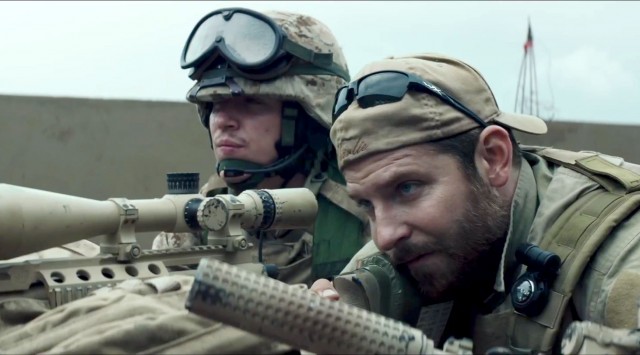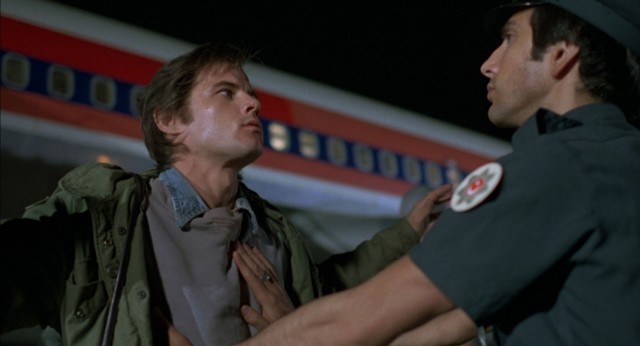AMERICAN SNIPER (Clint Eastwood, 2014)
In theaters now
www.americansnipermovie.com
 Three dozen years ago, I remember being blown away by Alan Parker’s Midnight Express, the supposedly true story of Billy Hayes, a New York City native busted for smuggling hash into Turkey in 1970 who ended up escaping from prison five years later. Although the film was based on Hayes’s book, it took liberties with the truth, turning Hayes into a heroic figure and inventing nonexistent characters; Hayes was particularly disappointed with the depiction of the Turkish people in the film. “My problem with the movie is there are no good Turks in it,” he said years later, pointing out that in reality he had made several good Turkish friends. “All the Turks in Midnight Express are bad. . . . It’s all very one-dimensional.” In 2004, screenwriter Oliver Stone apologized for his embellishments. “It’s true I overdramatized the script,” Stone said in Istanbul. “For years, I heard that Turkish people were angry with me, and I didn’t feel safe there.” Filmmakers are always given a certain amount of poetic license, but when does it become too much? The Midnight Express scenario ran through my mind shortly after seeing American Sniper, Clint Eastwood’s Oscar-nominated film about Chris Kyle, based on the Navy SEAL’s memoir about his multiple tours overseas, American Sniper: The Autobiography of the Most Lethal Sniper in U.S. Military History. It’s a tense, expertly made thriller about a sharpshooter who is compelled by the events of 9/11 to join the military and defend his country and democracy. Bradley Cooper is mesmerizing as Kyle, making viewers watch him as closely as he watches his targets. Cooper, who has been nominated for an Oscar three years in a row now, following nods for Silver Linings Playbook and American Hustle — he might also find himself up for a Tony for his bravura performance in The Elephant Man on Broadway, furthering confirming him as one of America’s finest actors — is especially effective when depicting the PTSD that deeply affected Kyle.
Three dozen years ago, I remember being blown away by Alan Parker’s Midnight Express, the supposedly true story of Billy Hayes, a New York City native busted for smuggling hash into Turkey in 1970 who ended up escaping from prison five years later. Although the film was based on Hayes’s book, it took liberties with the truth, turning Hayes into a heroic figure and inventing nonexistent characters; Hayes was particularly disappointed with the depiction of the Turkish people in the film. “My problem with the movie is there are no good Turks in it,” he said years later, pointing out that in reality he had made several good Turkish friends. “All the Turks in Midnight Express are bad. . . . It’s all very one-dimensional.” In 2004, screenwriter Oliver Stone apologized for his embellishments. “It’s true I overdramatized the script,” Stone said in Istanbul. “For years, I heard that Turkish people were angry with me, and I didn’t feel safe there.” Filmmakers are always given a certain amount of poetic license, but when does it become too much? The Midnight Express scenario ran through my mind shortly after seeing American Sniper, Clint Eastwood’s Oscar-nominated film about Chris Kyle, based on the Navy SEAL’s memoir about his multiple tours overseas, American Sniper: The Autobiography of the Most Lethal Sniper in U.S. Military History. It’s a tense, expertly made thriller about a sharpshooter who is compelled by the events of 9/11 to join the military and defend his country and democracy. Bradley Cooper is mesmerizing as Kyle, making viewers watch him as closely as he watches his targets. Cooper, who has been nominated for an Oscar three years in a row now, following nods for Silver Linings Playbook and American Hustle — he might also find himself up for a Tony for his bravura performance in The Elephant Man on Broadway, furthering confirming him as one of America’s finest actors — is especially effective when depicting the PTSD that deeply affected Kyle.
However, the film, written by Jason Hall, has come under attack for playing hard and loose with the facts and fomenting racial hatred, jingoistically creating a world in which all Americans are good, all Arabs are bad, with nothing in between. Kyle is no longer here to defend himself, but his book speaks volumes, as he refers to Iraqis as “savages” and “evil.” There have been many articles that have compared the book with the movie, and the differences are striking. The opening scene itself sets the stage for what is to come; in the book, this prologue is titled “Evil in the Crosshairs.” Kyle is on a rooftop as a troop of Marines move into a small Iraqi town. In the movie, a young woman and a boy appear on the street, carrying a Russian grenade; Kyle must decide whether to shoot the woman and the boy, a frightening choice for anyone to make. He ultimately kills them both. However, in the book, the woman is carrying a Chinese grenade, and there is no boy at all; he is a complete fiction. But by starting the film by showing that even Iraqi women and children are not to be trusted, Eastwood and Hall — and Cooper, who is also one of the producers — are making all Arabs the enemy.
It’s difficult to say how much is true and how much isn’t; Kyle was suffering from PTSD when he wrote the book, so his memory might have been shaky at times. (His claims of shooting looters in the aftermath of Hurricane Katrina have been unsubstantiated, and his declaration that all proceeds from the sale of the book would go to veterans charities has been questioned as well.) Kyle’s friend and fellow Navy SEAL Marcus Luttrell also wrote a book that was made into a movie, Lone Survivor, that had much of its accuracy debated as well. In December, American Sniper producer Rob Lorenz told the Washington Post, “You have to make choices and skip over some logic in order to fit the story on the screen in a reasonable amount of time.” Meanwhile, the eighty-four-year-old Eastwood told the Toronto Star that all the complaints are “a stupid analysis. . . . It was an important story, but you have to embrace [Kyle’s] philosophy if you’re going to tell a story about him.” So is American Sniper emblematic of a nation split between conservative, hawkish Republicans and liberal, dovelike Democrats? Does it matter that so many facts were changed when the “philosophy” is still intact? Should it be judged merely as a movie by itself, without everyone, including Michael Moore, Seth Rogen, and Bill Maher, analyzing its motives and themes in such detail? Well, it seems that the public, and the Academy of Arts and Sciences, has spoken. The film is breaking box-office records, having grossed more than $270 million worldwide and garnering six Oscar nominations, for Best Picture, Best Actor, Best Film Editing, Best Sound Editing, Best Sound Mixing, and, tellingly, Best Adapted Screenplay.

